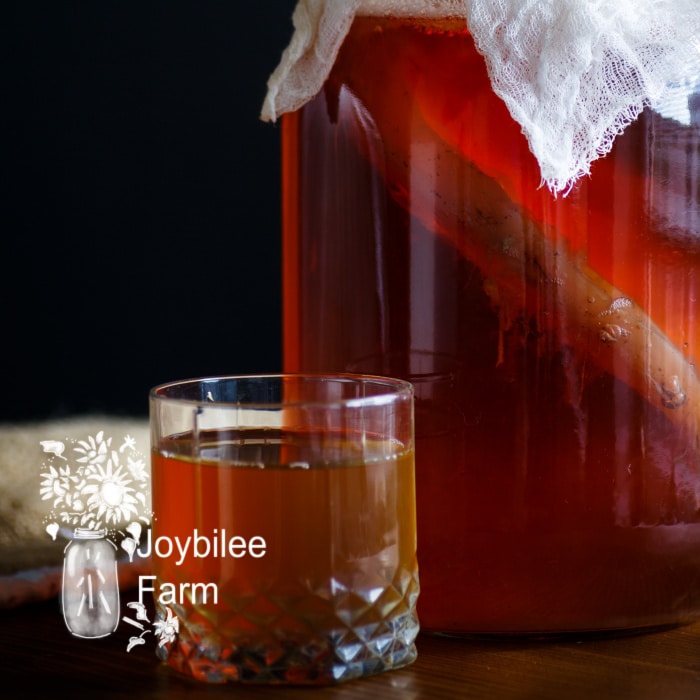Kombucha is simple to make, and a healthy source of probiotics for your diet. The kombucha scoby feeds off the tea, and the sugar you add, leaving a crisp barely sweet brew for you to enjoy. Homemade kombucha costs just pennies per serving and is full of many health benefits.
Kombucha Tea Benefits
Kombucha is one of the abundant health-giving, sustaining abundances of homestead living. Fermented foods are a natural part a healthy lifestyle. The good bacteria thrive in our homes and promote your health and well being. Of all the healthful fermented foods available for your homestead, Kombucha is probably the easiest to make, the easiest to sustain, and the one that packs the most punch for health benefits. Kombucha tea benefits include immune support, increased energy, and increased feelings of well being. Kombucha is an easy to prepare, super-star is easy to include in your homestead abundance.

18 health benefits of Kombucha
- Probiotics to support a healthy microbiome
- Digestive support (source)
- Liver support and detoxification (source) (source)
- Lowers blood pressure
- Rich in polyphenols and antioxidants like the tea it’s made from (source)
- Supports healthy metabolism
- Boosts immunity and reduce the risk of chronic disease
- Reduces the risk of allergies
- Improves energy
- Contains B vitamins and vitamin C
- Antibacterial (source)
- Antifungal
- Antiviral
- Reduces the risk of breast, colon, and prostate cancers (source) (source)
- Improves blood sugar control (source)
- Improves cholesterol levels (source)
- Supports healthy circulation
- Supports healthy weight loss
James and Phyllis Balch’s Prescription for Nutrition Healing (2nd edition) Lists the following medical issues that Kombucha tea benefits help address:
acne, aging skin, AIDS, arteriosclerosis (hardening of the arteries), arthritis, asthma, bronchitis, cancer, candidiasis, chronic fatigue, constipation, diabetes, diarrhea and other digestive disorders, hair loss, hemorrhoids, high cholesterol, hypoglycemia, incontinence in both men and women, kidney and gallstone disorders, menopausal problems, multiple sclerosis, premenstrual syndrome, prostrate problems, psoriasis, and weight problems. (Balch 557)
Kombucha can be trace back to China, Russia, Japan, and Korea, 2,000 years ago. Russian scientists studied kombucha from WW2 to the 1970s and found that it contains several substances necessary for good health.
“gluconic acid, which impedes the progression of viral infections and can dissolve gall stones; hyaluronic acid, a component of connective tissue; chondroitin sulfate, a component of cartilage; and mucoitin-sulfuric acid, a componenet of the stomach lining and the vitreous humor of the eye. The beverage also contains vitamins B1 (thiamine), B2 (riboflavin, B3 (niacin), B6 (pyridoxine), and B12; folic acid, lactic acid, dextrogyral, and usnic acid, a substance with strong antibacterial and antiviral effects.” Prescription for Nutritional Healing
Kombucha is easy to prepare at home with just black or green tea, the kombucha starter mushroom, or scoby, and organic sugar. The kombucha mushroom is a part lichen, part bacterium xylinum, and part natural yeast culture. It reproduces itself when placed in a tea sugar solution for 7 to 10 days. The tea and sugar feed the scoby, and the resulting kombucha is not sweet, as the scoby has eaten the sugar. The final kombucha contains less than 1% alcohol and some acetic acid.
Cost Breakdown of Homemade Kombucha:
Since 2013 there has been massive growth in the varieties, types, and flavors of the kombucha available in stores. When I first started brewing my own kombucha, there were only a few brands and options available. Now, there are dozens of options, brands, and even microbreweries creating this amazing drink. However, it is still less expensive to make your kombucha at home. Homemade kombucha costs less than a quarter to make, a quickly grabbed kombucha at the grocery store can set you back up to five dollars, or more. Brewing your own kombucha takes minutes of your time weekly, and if you have a booch habit, can greatly help your grocery budget too.
Black tea can be as cheap as 3 cents a tea bag. You use approximately 5 tea bags for a gallon brew of kombucha or 2 tablespoons of loose black or green tea. Sugar is roughly 15 cents per cup, and you use 1 cup per gallon. A gallon is 4 liters, or 16 cups of kombucha. Brewing 16 cups of kombucha at home for the kombucha tea benefits costs about 35 cents, less than half a dollar per batch. For cost comparison sake we will say it costs 50 cents to brew a gallon of kombucha. At a cup and a half serving (375 milliliters), you pay 5 cents per serving of homemade kombucha. The equivalent amount of kombucha from Costco would be about $12. Micro-brewed kombucha comes in at $5 a can at the health food store, and would work out to about $40 for an equivalent volume.
My cost estimation for home-brewed kombucha is on the lowest end. It will cost a bit more, if you use high quality loose leaf black tea, or a specialty kombucha tea blend, and organic unrefined sugar. However, even that will still be well below what you would pay for the convenient and highly packaged product at your local store.

See my easy to follow instructions for growing your own kombucha mushroom from a commercial bottle of raw Kombucha tea or get a live scoby here. Once you have a thriving starter culture of kombucha you can keep it going for a lifetime, if you take good care of it. You’ll eventually get enough baby scoby (Kombucha babies) to pass them on to friends and family. You can grow new starters with your own kombucha tea intentionally by following these easy instructions for growing kombucha from a commercial bottle of raw Kombucha, but substitute your own homemade raw Kombucha for the commercial bottle of Kombucha.
Fermented foods offer perpetual homestead abundance. They are always available to give you their health benefits, and they are easy and economical to make.
Back to You:
What is your favorite flavor of homemade kombucha? If you’ve made kombucha, what did you wish you’d known when you started? Leave a comment.



Leave a Reply